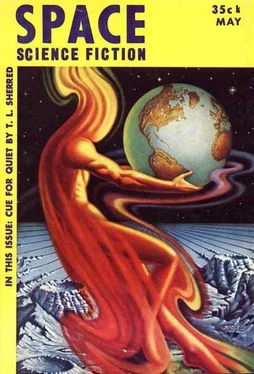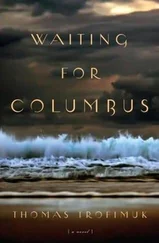Thomas Sherred - Cue for Quiet
Здесь есть возможность читать онлайн «Thomas Sherred - Cue for Quiet» весь текст электронной книги совершенно бесплатно (целиком полную версию без сокращений). В некоторых случаях можно слушать аудио, скачать через торрент в формате fb2 и присутствует краткое содержание. Год выпуска: 1953, Издательство: Space Science Fiction, Жанр: Фантастика и фэнтези, на английском языке. Описание произведения, (предисловие) а так же отзывы посетителей доступны на портале библиотеки ЛибКат.
- Название:Cue for Quiet
- Автор:
- Издательство:Space Science Fiction
- Жанр:
- Год:1953
- ISBN:нет данных
- Рейтинг книги:5 / 5. Голосов: 1
-
Избранное:Добавить в избранное
- Отзывы:
-
Ваша оценка:
- 100
- 1
- 2
- 3
- 4
- 5
Cue for Quiet: краткое содержание, описание и аннотация
Предлагаем к чтению аннотацию, описание, краткое содержание или предисловие (зависит от того, что написал сам автор книги «Cue for Quiet»). Если вы не нашли необходимую информацию о книге — напишите в комментариях, мы постараемся отыскать её.
Cue for Quiet — читать онлайн бесплатно полную книгу (весь текст) целиком
Ниже представлен текст книги, разбитый по страницам. Система сохранения места последней прочитанной страницы, позволяет с удобством читать онлайн бесплатно книгу «Cue for Quiet», без необходимости каждый раз заново искать на чём Вы остановились. Поставьте закладку, и сможете в любой момент перейти на страницу, на которой закончили чтение.
Интервал:
Закладка:
America, it was learned today, has at last an absolute defense, not only to the atomic bomb, but to every gun, every airplane, every engine, every weapon capable of being used by man. Neither admitted nor denied at this early date by even the highest government officials, it was learned by our staff late last night that America's latest step forward….
Column after column of stuff like that. When the reporter got through burbling, he did have a few facts that were accurate. He did say it was my doing that set off the last atomic bomb test; he did say that I was apparently invulnerable to violence powered by electrical or internal combustion engines; he did say what I could do, and what I had done, and how often. He didn't say who I was, or what I looked like, or where I'd come from, or what I did or didn't know.
Sprinkled through the story-and I followed it back to Page 32 and the pictures rehashed of the traffic jam in Detroit-were references to T. Sylvester Colquhoun, the boy who dumped the original plate of beans. He attested this and swore to that. Whoever he was, wherever he got his information, he-there was his picture on Page 32, big as life and twice as obnoxious; Mr. Whom and the van Dyke.
Guiltily I handed the paper over to Stein, who turned back to the front page and started again from the beginning. I tried to carry things off in the nonchalant manner, but I couldn't. I had to watch the Old Man light a cigarette with fumbling fingers, take a few snorting puffs, and crush it viciously under his heel. Miller and his temper.
–
Whom-or T. Sylvester Colquhoun-had, quite obviously, a grudge against the short left that had given him his concussion. According to the Sentinel , he had babbled a bit when he was released from the hospital, and an alert newshawk had trailed him to his home and bluffed him into spilling the whole story. He had sense enough, at that late stage of the game, to keep my name out of it, if he ever knew it. The reporter had gone to his editor with the story, who had laughed incredulously at first, and then checked Kellner at the laboratory. Kellner had clammed up, and when the now suspicious editor had tried to check Colquhoun's tale personally, Colquhoun had vanished. A snooping neighbor had noted the license of the car that had taken him away. The Highway Department-the editor must have moved fast and decisively-showed the license plate as issued to a man the editor knew personally as a special agent of the Kansas City Branch of the FBI.
–
Then hell began to pop. Repeated long-distance calls to Washington ran him up against a stone wall. The answers he got convinced him that there was something to Colquhoun's wild tale, something weird and yet something that had a germ of truth. (Half of this, understand, was in the Sentinel . The other half I picked up later on, adding two and two.) As he was sitting mulling things over it was his turn to get a call from Washington. The State Department was on the line; Morgan, the Under Secretary.
Morgan fairly yelled at him. "Where did you get that information? What's the idea?" and so on. That clinched it for the editor. Then it was he knew.
Morgan made his mistake there. He began to threaten, and the editor hit the ceiling. Hit it hard, because he stretched things a little. He stretched it more than just a little.
He said, "Furthermore, that's on the street right now-this is a newspaper, not a morgue!"
It wasn't on the street, the editor knew. Perhaps he wanted to throw a scare into Morgan, perhaps-But Morgan!
Morgan gasped, "Oh, my God!" and hung up with a bang.
–
The editor flipped a mental coin. His circulation was not what it should be, the boss had been riding him lately, his job might be where a beat would tilt the balance up or down. The national safety that Morgan had shouted about-well, if we had the perfect weapon and the perfect defense, what was there to fear? And this was a newspaper, not a morgue! They replated, and the first extras hit the street to wake up half the city. The wire services had the story and extras were rolling throughout the country, or the world, about the time I was watching the sun over Lake Ste. Clair.
Neither the State Department nor the FBI were on their toes that day. Instead of denying everything, or instead of laughing heartily at the pipedream of an editor trying to sell an extra edition or two, whoever was pulling the strings behind the scenes demanded flatly that all wire services kill and disregard all references to Colquhoun. No one ever made a newspaperman do what he really didn't want to do. The very fact that the government was so eager to kill the story made every newsman worthy of his salt all the more eager to break the paper-thin shell around the meaty yolk. By noon, the time we landed for fuel, every Washington correspondent for every news service had a little different story for his boss, the White House was practically besieged at the mere rumor that the President was to issue a statement, and the State Department was going quietly mad.
"Not so quietly, at that," the Old Man said sourly. "One hour straight I stayed on that telephone. One hour straight I talked to one bunch of raving maniacs, and all the common sense I heard would go into your left eye."
By that time his temper had cooled below melting, and we were again on reasonably good terms. I was curious to know just who the Old Man had talked to.
He grunted. "Just about everyone in Washington with any authority at all. No one with any intelligence."
I could appreciate that. I have a very low opinion of anyone who stays in Washington any longer than necessary.
I asked him, "We're apparently heading back there. Why? Where were we going when they stopped us?"
He wasn't sure. "I wanted to keep on going," he said, "and get you out of the country. I still think that would have been best. There was to be a cruiser waiting at Bremerton for a shakedown cruise. But whoever is running all this-and I don't think that the President has thought too much about it-wants us to get back to Washington for another conference."
"Another meeting?" I was disgusted. Washington political rashes manifest themselves most often by the consistent eruption of conferences in which nothing is said, nothing decided, nothing done. "What does who think what?"
He blinked, and then smiled. "I couldn't say. I've been in this game only twenty years. At any rate, you can see who's worried."
I didn't see, exactly.
"No?" He was amused. "Don't you remember the discussion we had about who was going to watch the watchers? Now that there's been a leak, the Army is going to blame the Navy, the Navy is going to blame the FBI, and I take punishment from all three." He sighed. "My department seems, invariably, to be in the middle."
I let it go at that. I didn't have the heart to remind him that a good portion of the trouble and friction this country has had in its history has been because the State Department has been sitting on the water bucket when it should have been playing deep centerfield. No use worrying about things until the fuse is burnt half its length, I thought. That might be, for me and all of us, a good policy to adopt, for the time being. Let the boys at the top fret and worry; let them wrack their brains and beat their heads against the wall. I'd do what they told me, if I could. The man that pays the salary worries about the unemployment tax.
"Stein," I said, "are there any more of those sandwiches?"
–
The Old Man settled back in his seat and began to read the Kansas City Sentinel all over again. He was still worried when we landed in Washington.
He left in a waiting black sedan, and Stein and I stayed in the ship until it was yanked into a dark hangar by a tiny tractor with great rubber tires. We slid out the back of the hangar when the wary Stein thought it was safe, and a taxi rolled us to the Mayflower. There we registered, I was told, as James Robertson and William Wakefield, Wisconsin Dells.
Читать дальшеИнтервал:
Закладка:
Похожие книги на «Cue for Quiet»
Представляем Вашему вниманию похожие книги на «Cue for Quiet» списком для выбора. Мы отобрали схожую по названию и смыслу литературу в надежде предоставить читателям больше вариантов отыскать новые, интересные, ещё непрочитанные произведения.
Обсуждение, отзывы о книге «Cue for Quiet» и просто собственные мнения читателей. Оставьте ваши комментарии, напишите, что Вы думаете о произведении, его смысле или главных героях. Укажите что конкретно понравилось, а что нет, и почему Вы так считаете.












